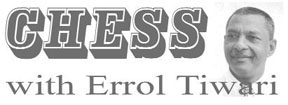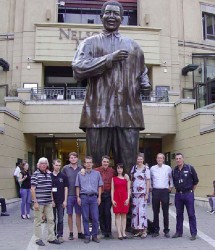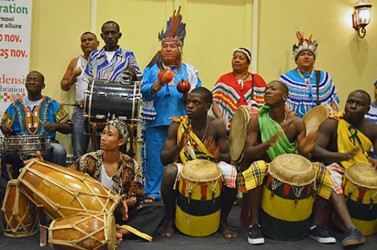Solution
The solution to last week’s puzzle is as follows: ….exf3. If gxf3, Qg4.
‘Hating clouds the mind. It gets in the way of strategy. Leaders cannot afford to hate.’
– Nelson Mandela, 2007, when asked the question: ‘After such barbarous
torment, how do you keep hatred in check?’
Sadly, Nelson Mandela expired ten days ago. At 95, his journey was lengthy and arduous. He travelled from the court of tribal royalty, to the liberation underground, to a prison rock quarry and, finally, on to the presidential suite of Africa’s richest country. He became an “international emblem of dignity and forbearance,’’ 
It would seem unusual for this column to feature Mandela, but while he was imprisoned for 27 years, how did he while away his spare time on Robben Island? He played chess of course. Chess surrounded Mandela! Neville Alexander, a fellow detainee and political activist was half Mandela’s age when he arrived on the island in 1964, about the same time as Mandela. He was imprisoned for ten years. Alexander recorded an interview with Frontline’s John Carlin where he spoke of Mandela, the chess player. Here is an excerpt:
“He would take his time with every move. He would consider it very carefully. He would sort of mislead the other person by pointing things, this way, that way, the other, and then making the move that wasn’t expected and so on.’’
Would you say this method of playing chess assisted in shaping Mandela’s life?
The President of South Africa, Jacob Zuma, who was in prison at the same time as Mandela and suffered the many hardships of Robben Island, explained the relationship between chess and the prisoners:


“On Robben Island, chess provided a solace to us that we needed in those conditions of isolation and deprivation. It propelled our minds beyond the confines of the prison walls and allowed us to reflect and to position our thoughts strategically to fight the regime. Many comrades made chess sets out of soap and driftwood that allowed us to continue to play this noble and great game. We improvised with makeshift chess boards and we enjoyed the fullness of the game.’’ (Excerpt from a speech delivered by President Zuma, July 2013, at the Commonwealth and South African chess tournament in South Africa)
Chess continues to be popular in South Africa today, and owing to its educational properties, we expect its popularity to ascend to even greater heights in the future.
Wendell Meusa emerged victorious in the national chess championship, and is now the Guyanese chess champion. Taffin Khan and Anthony Drayton ended in a tie, half a point below Meusa’s score of six points, and were tied on joint second. Meusa defeated Khan, the previous champion, in their individual encounter.




